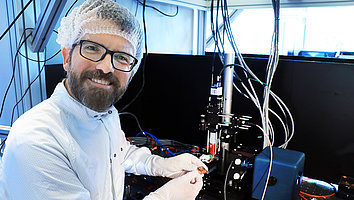Strengthening German-British collaboration in high-performance photonics
Berlin-based Ferdinand-Braun-Institut (FBH) and the University of Glasgow to deepen cooperation, focusing on ultra-high-power photonic applications and enhanced exchange of photonics experts and students through the newly established Visiting Professorship of Paul Crump from FBH in Glasgow.
Pushing the limits of high-power diode lasers! This is just one of the ambitious goals of the cooperation between the Ferdinand-Braun-Institut (FBH), Berlin, Germany and the University of Glasgow, United Kingdom (UK). The partnership, which began in 2020 has since evolved into a robust and dynamic collaboration. It has already led to some important results underpinning laser optimization, for example, with joint work published in Applied Physics Letters and further insights due to be presented at the International Semiconductor Laser Conference in Florida later this year. The partners have also started a new UK Research and Innovation Impact Acceleration mobility project, which aims to develop a testbed and roadmap for optical wireless power transmission technologies.
By leveraging the complementary skills, expertise, and cutting-edge technologies of both organizations, the cooperation is now set to deepen. The joint efforts will focus on advancing emerging ultra-high-power photonic applications, including wireless power transfer systems. Key areas of research include studies into the physics and material science of semiconductor materials and devices, and their use in general to drive forward the development of innovative and high-performance photonic devices.
Intensified expert exchange and new Visiting Professorship
To strengthen the partnership between both institutions, Dr. Paul Crump, Head of FBH’s High-Power Diode Lasers Lab, will assume the role of a Visiting Professor of Photonics at the James Watt School of Engineering at the University of Glasgow starting in August 2024. He will work closely with Professor Stephen Sweeney’s group at the University of Glasgow, fostering collaboration between two of the world’s leading photonics institutes.
The Visiting Professorship will serve as a catalyst for joint research initiatives and funding proposals, while also exploring new avenues for researcher mobility between Glasgow and Berlin. Through this role, Paul Crump, in collaboration with Stephen Sweeney, will work to bridge connections between British and German researchers and industry, thereby enhancing the ties between the German and UK photonics and semiconductor communities.
Additionally, the Visiting Professorship will focus on supporting the education and employability of students in both the UK and Germany. This includes creating opportunities for bilateral student exchanges between the FBH in Berlin and the University of Glasgow. Paul Crump will also contribute to the supervision and development of Masters, Doctoral students, and early-career researchers. Moreover, he will deliver guest lectures to students at Glasgow, emphasizing the critical role of semiconductor and photonics technologies.
